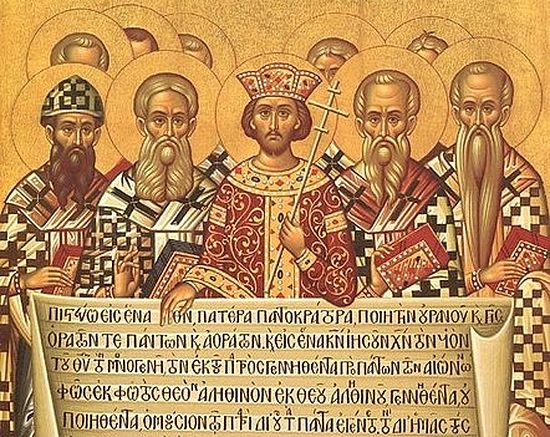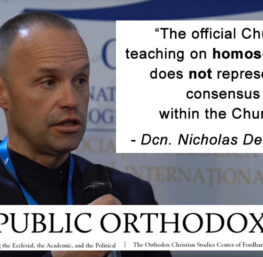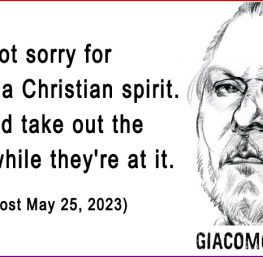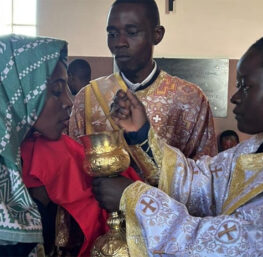 Following the release of Bishop Kallistos Ware’s scandalous Foreword in the latest issue of The Wheel journal and the critical summary published by the OrthodoxNet Blog, several Orthodox priests and an Orthodox professor have also written articles that challenge Met. Ware’s misleading questions, manipulative arguments, and theologically unsound opinions.
Following the release of Bishop Kallistos Ware’s scandalous Foreword in the latest issue of The Wheel journal and the critical summary published by the OrthodoxNet Blog, several Orthodox priests and an Orthodox professor have also written articles that challenge Met. Ware’s misleading questions, manipulative arguments, and theologically unsound opinions.
Anatomy of a Foreword: Metr. Kallistos on Sexual Morality
by Fr. John Cox
Met. Kallistos Clearly Implies that the Church Should Bless Committed Same-Sex Relationships
by Fr. Juvenaly Repass
Metropolitan Kallistos and The Wheel
by Fr. Lawrence Farley
The Unbearable Essentializing of Being: Metropolitan Kallistos Ware’s Sorrowful Joy of Sex
by Reader Dr. Alfred Kentigern Siewers
The Church and Homosexuality: A Meditation
by Fr. Herman (Hieromonk) Majkrzak
(Editors Note: While Fr. Herman doesn’t directly mention Met. Kallistos Ware’s article, he published his essay following the Foreword’s release and he providentially challenges similar false ideas regarding homosexuality and the attempts by some clergy inside the Orthodox Church to distort and undermine the Church teaching.)
![]()
Reproduced below are several excerpts from three different Orthodox priests that are especially relevant to consider. (We recommend reading all the article in full, since they provide a more comprehensive picture of all the scriptural, moral, and theological issues.)
Fr. John Cox on how Met. Kallistos structured his argument:
“Which gets us to the heart of the matter. In the hypothetical scenario [by Met. Ware] of the promiscuous and monogamous gay men which follows his question there are two distinct sins under consideration— promiscuity and homosexuality—but they are not distinguished. Rather they are conflated which puts us in a pastoral bind. By asking whether celibacy is a burden too heavy to impose on homosexuals in the Church the Metropolitan certainly doesn’t intend to suggest that promiscuous sex ought to be permissible.
But the only other way to answer his question affirmatively, to get out of the bind, without establishing new inequities between the way homosexual unmarried and heterosexual unmarried people are treated, would be to recognize monogamous homosexual relations as permissible within the Church.
This puts us, the readers, in a situation in which two options emerge more distinctly than anything else: embrace the cruelty of the current situation or change the rules so that promiscuity remains verboten while homosexual monogamy is permitted. This conclusion is not forced on the reader but gently commends itself from the gathered material.”
But what is the only way for the Church to “recognize monogamous homosexual relations as permissible within the Church”? Only through MARRIAGE, of course! There is no other way for the Church to bless such relations. This is heretical and wrong. Met. Kallistos is betraying the true teaching and right theology of the Orthodox Church, undermining the Moral Tradition, and contradicting Scriptures!
Fr. Juvenaly Repass on Met. Kallistos Ware’s misleading views and erroneous teaching:
In his Foreword to The Wheel magazine Met. Kallistos Ware doesn’t just say “let’s learn more about this problem,” he questions whether Church teaching is right. He asks whether it is right for us (the Church) to impose on persons of same-sex orientation, the “heavy burden” of not being able to marry. The very clear implication is that they should be able to marry (in Church)!
Or perhaps he means that they should be able to have some sort of church blessing other than marriage – but in the Orthodox Church, marriage is the only context in which sexual union is blessed; apart from marriage, it is deemed sinful, and how can what is sinful be blessed?
It is shameful that a hierarch would hold these views, and worse still (if that’s possible) that a hierarch would mislead others by disseminating these opinions. Met. Kallistos has stepped over a line, and he should be disciplined.
Reader Dr. Alfred Kentigern Siewers on the secular academic heterodoxy of Met. Kallistos:
The heterodoxy at work in Metropolitan Kallistos’ new teaching is a now too-familiar neo-Gnosticism, seeking to turn the body into an object along with other people, and salvation into an intellectual exercise of the enlightened. That modern adaptation of ancient heresy has brought a heavy price for mankind in its effort to ravage Orthodox anthropology, emerging in tandem with systems of oppression that would try to set up the wills of an enlightened elite over the faithful and subdue the noetic life of the Church.
Conciliar Medicine
This anthropological heresy comes as a movement, but not through inspired Church Councils, rather via academics. Efforts to objectify sexual identity within the Church meanwhile belittle the faithful laity and would force them into a catacomb Church. Such efforts nurture a consumerist metaphysical materialism in which the body becomes only a manipulable object at the bidding of self-will and the passions. It serves the end of a technocratic class politically: Secular power and sensual excitement become their ultimate ideal, with pacification of the hoi polloi through false comfort serving as their modus operandi.The Fifth and Sixth and Seventh Ecumenical Councils long ago offered antidotes for such confusion over the integration of Christology and anthropology in Orthodoxy. It is sad to see Metropolitan Kallistos, with such a gifted mind and talented pen, to which I owe much myself, waver into such heresy. We may pray that what he has lost as a philosopher he can regain as a beloved shepherd of the faithful, namely Orthodox dogma and faith.
Fr. Herman (Hieromonk) Majkrzak on betrayers inside the Church:
The Church really is on a voyage; her destination is the safe harbor of the Age to Come. Her captain is Christ; her officers: bishops and priests. And she has a crew: everyone whom she has drawn up out of the baptismal waters and whom she has branded—not with iron but with chrism—as enlisted warriors of Christ. Warriors, because this is no luxury cruise ship! The Church is a battleship, and her course lies through seas plagued with piracy: Satan and his demonic hosts who hate the Name of Jesus and who seek the ruin of Christians.
Such are the enemy forces without, but they have agents inside the Church as well, because they have found that infiltration is often more effective than direct attack. The devil wants the Church to change course and so get lost at sea and come to shipwreck. But he keeps this goal hidden from his agents—or rather his dupes. These insiders are usually officers—bishops and priests, that is—and they think the Church should alter its course (by just a few degrees!) in order to sail in less hostile weather. For these officers, arrival at the advertised destination isn’t really the point. In fact, they find the old belief in the stark alternatives of safe harbor or ocean floor to be either very naive or very heartless. Heaven-or-hell theology bores them, but as officers they must play their part for the time being. Quietly and gently, but persistently, they ask their questions, they sow their doubts. “Did God really say…?” Thus they lay the groundwork for mutiny.
…
Every era of human thought and culture has its own characteristic blind spots, its own vulnerabilities. As the Church, we must recognize impaired visibility in society and compensate for it. In the twenty-first century, our cultural blind spot comprises everything relating to sex. Even if we strain our eyes, we find it difficult to discern in sexual sin the degradation and destructiveness that were so obvious and so troubling to our forebears. We have itching ears for speculation and experimentation of all kinds—homosexuality is just the beginning. Dazzled and captivated by promising new vistas of human self-definition, we are oblivious to the icebergs ahead. But those who have gone before us see more clearly, and they’re calling back to us. Their shrill warnings interrupt our amusements and blare in our ears. So we cut them off: “Keep out! Shut up! I’m working Cape Race!” We’re unsinkable, we think. What could go wrong?





When the church leaves its foundation and enters the theatre of the secular we invite these delusions. We cannot serve God and man. When our seminaries ventured to be accredited with the blessing of the secular state we veered off course. When you engage in the working of academia that places its devotion to politics and political correctness you face a collision. In order for some of our bishops, priests and professors to “be liked” they must bend to the social pressures .If they are considered too conservative they will be shunned by the secular academics. Take the way of the apostles and seek not acceptance of men but of God.
I converted to Orthodoxy because the hard rock theology was what I needed.
Met. Kallistos position on this issue degrades my rationale. More accurately, it flies in the face of Christ’s teachings and other Biblical law.
I don’t know what the Church hierarchy will do, but it must do something.
To me this Foreword signed by the Bishop Kallistos Ware is far from being a surprise. The man who supervised the publication of The Philokalia has expressed during the last two or three decades a sense of secularism and also an ecumenism that leaves a lot to desire. He prves one more time that he has a callous personality or he has problems of reaching the virtue of discernment
Even in the book on the Orthodox Church he was nice to the Islam downplaying the atrocities of the last 1,400 years inflicted upon the Christians in the Middle East and the East of Europe.
The late elder of Romania, Father Cleopa said it once that, one kind of judgement is going to be reserved for the little layman with petty sins and a different final exam for the people at top of the government as well as the hierarchy of the Church.
On the same delusional line of thinking, I had the chance to hear another Archbishop that, I am not going to mention his name, who was embracing without a doubt the new fashion of considering homosexuality as a birth-given definition. This is an easy exit from this debate and a Calvinist-like answer in a sense of a pre-destination.
If the Seven Ecumenical Councils have not approved such a deviation from the axis of the Christian Doctrine then nobody, even a bishop, is allowed to moderate such a debate and confuse the flock of the faithful.
I appreciate the courage of the above mentioned priests to take a stand against such a divisive and manipulative rhetoric. Axios to each one of them!
even if homosexuality were sometimes a genetic mutation built in thing that doesn’t make it okay any more than diabetes is okay or other inherited disease is okay. its not healthy. you can choose to not act on it, and you can control your diet if you got diabetes. if you had an inherited bad temper (might exist) that would just mean more than usual temptation to overcome, same deal with homosexuality.
The problem is that those who are pushing the approval of the LGBT “agenda” are being misled by human sentiment instead of Godly love. Christ told the woman caught in the act of adultery to, “Go, and sin no more.” He recognized her actions as sinful and not “okay.” Nonetheless, He showed compassion and love. It is a lesson for us in Christian love and compassion.
The Church has to discipline those that go against Catholic Apostolic Doctrine, and against both the written and the oral tradition. In this case their willingness, to challenge everything the Church of Christ has always and everywhere stood for, demands their being disciplined. If this discipline is not forthcoming, and swiftly so, the corruption that this pollution brings into the Body of Christ will fester. Let me remind everyone, that if the Papacy’s penchant for, erecting itself as the absolute monarchy ruling and imposing its designs on all Christianity, would have been faced at once, the very first time it reared its ugly head, then there would not have been a Great Schism and, almost surely, no Reformation. Cancer must be cut-off from the body before it can metastize! Hersy, and bad doctrine are cancers on the Church, lets pull them out from the root at once. Tolerance is a virtue as long as it is not tolerance of evil or potential evil.